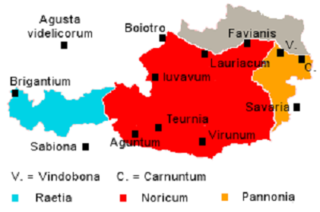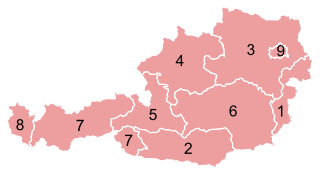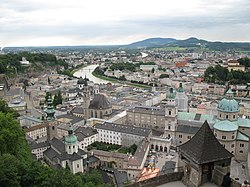Austria
country in Central Europe From Wikipedia, the free encyclopedia
Republic of Austria | |
|---|---|
Anthem:
| |
 Location of Austria (dark green) – on the European continent (green & dark grey) | |
| Capital and largest city | Vienna 48°12′N 16°21′E |
| Official languages | German (also in national language as Austrian German) |
| Recognised regional languages | |
| Ethnic groups (2012) | |
| Religion (2018[4]) |
|
| Demonym(s) | Austrian |
| Government | Federal parliamentary republic |
| Alexander Van der Bellen | |
| Alexander Schallenberg | |
• Vice Chancellor | Werner Kogler |
| Legislature | Parliament |
| Federal Council | |
| National Council | |
| Establishment history | |
• Margraviate of Austria | 976 |
• Duchy of Austria | 1156 |
| 1453 | |
| 1804 | |
| 1867 | |
• First Republic | 1918 |
| 1934 | |
| 1938 | |
• Second Republic | since 1945 |
• State Treaty in effect | 27 July 1955 |
| 14 December 1955 | |
| 1 January 1995 | |
| Area | |
• Total | 83,883 km2 (32,387 sq mi) (113th) |
• Water (%) | 0.84 (as of 2015)[5] |
| Population | |
• October 2020 estimate | 8,935,112[6] (97th) |
• Density | 106/km2 (274.5/sq mi) (106th) |
| GDP (PPP) | 2018 estimate |
• Total | $461.432 billion[7] |
• Per capita | $51,936[7] (17th) |
| GDP (nominal) | 2019 estimate |
• Total | $446,315 billion[7] (27th) |
• Per capita | $50,277[7] (15th) |
| Gini (2019) | 27.5[8] low · 14th |
| HDI (2019) | 0.922[9] very high · 18th |
| Currency | Euro (€)[c] (EUR) |
| Time zone | UTC+1 (CET) |
| UTC+2 (CEST) | |
| Driving side | right |
| Calling code | +43 |
| ISO 3166 code | AT |
| Internet TLD | .at[d] |
| |
Austria (/ˈɒstriə/ (![]() listen), /ˈɔːs-/;[10] German: Österreich [ˈøːstɐʁaɪç] (
listen), /ˈɔːs-/;[10] German: Österreich [ˈøːstɐʁaɪç] (![]() listen)), officially the Republic of Austria (German: Republik Österreich [ʁepuˈbliːk ˈʔøːstɐʁaɪç] (
listen)), officially the Republic of Austria (German: Republik Österreich [ʁepuˈbliːk ˈʔøːstɐʁaɪç] (![]() listen)), is a country in Central Europe. Around Austria there are the countries of Germany, Czech Republic, Slovakia, Hungary, Slovenia, Italy, Switzerland, and Liechtenstein.
listen)), is a country in Central Europe. Around Austria there are the countries of Germany, Czech Republic, Slovakia, Hungary, Slovenia, Italy, Switzerland, and Liechtenstein.
The people in Austria speak German, a few also speak Hungarian, Slovenian and Croatian. The capital of Austria is Vienna (Wien).
History
Austria is more than a thousand years old. Its history can be followed to the ninth century. At that time the first people moved to the land now known as Austria. The name "Ostarrichi" is first written in an official document from 996. Since then this word has developed into the Modern German word Österreich, which literally means "East Empire."
Ancient times
There has been human settlement in the area that is now Austria for a long time. The first settlers go back to the Paleolithic age. That was the time of the Neanderthals. They left works of art such as the Venus of Willendorf. In the Neolithic age people were living there to dig for mineral resources, especially copper. Ötzi, a mummy found in a glacier between Austria and Italy, is from that time. In the Bronze Age people built bigger settlements and fortresses, especially where there were mineral resources. Salt mining began near Hallstatt. At that time, Celts began to form the first states.
The Romans

The Romans came 15 B.C. to Austria and made the Celtic Regnum Noricum to a province. Modern Austria was part of three provinces, Raetia, Noricum and Pannonia. The border in the north was the Danube.
Holy Roman Empire
From the early Middle Ages, the area of modern-day Austria was a part of the Holy Roman Empire. The capital of the Holy Roman Empire was the Austrian city Vienna. The Austrian Habsburg family were the rulers of the Empire and the son of the Holy Roman Emperor held the title of Archduke of Austria.
In 1806, France defeated the Holy Roman Empire and replaced it with the Confederation of the Rhine. Former Holy Roman Emperor Francis II became the Emperor of the new Austrian Empire, which later became Austria-Hungary.
Modern history
In 1869, the first postcards were sent from Austria.[11] In the first three months after they were issued, almost 3 million cards were sold.[11]
In 1914, Franz Ferdinand was assassinated in Sarajevo. Austria-Hungary declared war on Serbia and this led to World War I. In 1918, both Austria and Hungary became republics. They also both split into two separate countries.
During World War II, Austria was part of Nazi Germany. It became independent in May 1945.
Geography

Austria is a mountainous country since it is partially in the Alps. Grossglockner is the tallest mountain in Austria. The high mountainous Alps in the west of Austria flatten somewhat into low lands and plains in the east of the country where the Danube flows.
Climate
Austria has a continental climate.
The highest temperature ever recorded in Austria was 40.5 °C (104.9 °F), on 8 August 2013 in Bad Deutsch-Altenburg.[12] The lowest temperature ever recorded in Austria was −52.6 °C (−62.7 °F), on 19 February 1932 at Grünloch doline.[13]
Politics


Austria is a democratic republic. The President of Austria is the head of state and the Chancellor of Austria is the head of government.
It is a neutral state, that means it does not take part in wars with other countries. It has been in the United Nations since 1955 and in the European Union since 1995.
Austria is also a federal state and divided into nine states (German: Bundesländer):
- Burgenland (Burgenland)
- Carinthia (Kärnten)
- Lower Austria (Niederösterreich)
- Upper Austria (Oberösterreich)
- Salzburg(erland) (Salzburg)
- Styria (Steiermark)
- Tyrol (Tirol)
- Vorarlberg (Vorarlberg)
- Vienna (Wien)
A new cabinet (Austria) was formed (February 2025). It is formed by political parties ÖVP, SPÖ, and Neos.
The chancellor [was] Karl Nehammer [until January].[14] Austria has been a member-state of the United Nations since 1955, the European Union since 1995 and OPEC since 2019.
More information: States of Austria.
Culture
Music and Arts
Many famous composers were Austrians or born in Austria. There are Wolfgang Amadeus Mozart, Joseph Haydn, Franz Schubert, Anton Bruckner, Johann Strauss, Sr., Johann Strauss, Jr. and Gustav Mahler. In modern times there were Arnold Schoenberg, Anton Webern and Alban Berg, who belonged to the Second Viennese School.
Austria has many artists, there are Gustav Klimt, Oskar Kokoschka, Egon Schiele or Friedensreich Hundertwasser, Inge Morath or Otto Wagner and scienc.
Food
Famous Austrian dishes are Wiener Schnitzel, Apfelstrudel, Schweinsbraten, Kaiserschmarren, Knödel, Sachertorte and Tafelspitz. But you can also find a lot of local dishes like Kärntner Reindling (a kind of cake), Kärntner Nudeln (also called "Kärntner Kasnudeln", you may write it "...nudln" too), Tiroler Knödl (may be written "...knödel"; ), Tiroler Schlipfkrapfen (another kind of "Kärntner Nudeln"), Salzburger Nockerl (also may be written ..."Nockerln"), Steirisches Wurzelfleisch (..."Wurzlfleisch") or Sterz ("Steirischer Sterz").
UNESCO World Heritage Sites in Austria
- Historic Centre of Salzburg — 1996
- Schönbrunn Palace — 1996
- Hallstatt–Dachstein Salzkammergut Cultural Landscape — 1997
- Semmering Railway — 1998
- Historic Centre of Graz and Schloss Eggenberg — 1999 (extended in 2010)
- Wachau Cultural Landscape — 2000
- Historic Centre of Vienna — 2001
- Lake Neusiedl — 2001
Gallery
- Schönbrunn palace
- Graz
- Wachau
- Hallstatt
- Salzburg
- Semmering railway
- Schloss Eggenberg
- Vienna
- Neusiedler See
Related pages
References
Other websites
Wikiwand - on
Seamless Wikipedia browsing. On steroids.











